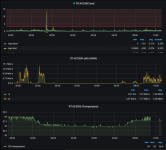Hi to all,
I've already in place a collectd-influxdb-grafana chain that monitors a few metrics (network, mem and load) on my Asus RT-AC5300.
I'm now in need to retrieve also the CPU thermal value. I've looked here in the forum: getting it via CLI is as simple as:
followed by an awk that extracts only the first 2 chars from $4 (I can't seem to post it here without getting an error in the submission).
I know I could use the collectd:exec plugin but it's something I avoid when possible because of its resources requirements. But I can't seem to properly configure the collectd.thermal plugin.
If I just load it in the config (even without any config), I get:
Adding a config section doesn't change the result.
Has anyone tried or succeeded at this ?
I've already in place a collectd-influxdb-grafana chain that monitors a few metrics (network, mem and load) on my Asus RT-AC5300.
I'm now in need to retrieve also the CPU thermal value. I've looked here in the forum: getting it via CLI is as simple as:
Bash:
cat /proc/dmu/temperatureI know I could use the collectd:exec plugin but it's something I avoid when possible because of its resources requirements. But I can't seem to properly configure the collectd.thermal plugin.
If I just load it in the config (even without any config), I get:
Code:
plugin_load: plugin "thermal" successfully loaded.
Initialization of plugin `thermal' failed with status -1. Plugin will be unloaded.
plugin_unregister_read: No such read function: thermal
Error: one or more plugin init callbacks failed.
Exiting normally.Adding a config section doesn't change the result.
Has anyone tried or succeeded at this ?
Last edited:


